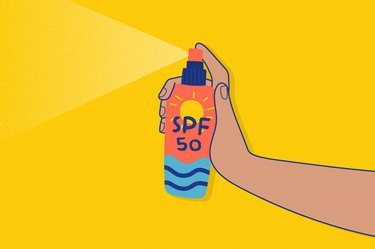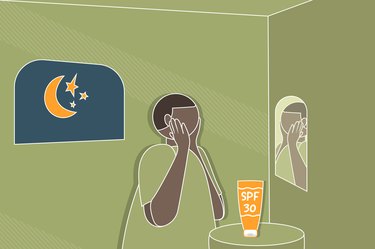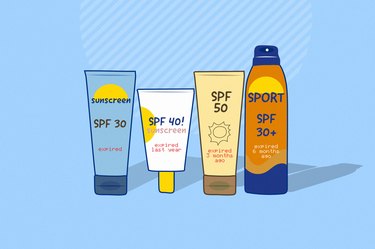
If there's one thing dermatologists want you to know, it's that you should wear sunscreen every day. That's right: Sunscreen isn't just for the dead of summer or when you're on a tropical vacation — it's a must for all seasons to protect your skin from UV damage.
Applying sunscreen daily can seem like a chore, though. Which is why spray sunscreen may seem like a quicker, more convenient option.
Video of the Day
Video of the Day
But is spray sunscreen effective? And is it safe?
Here, we spoke to dermatologists to find out if spray sunscreen is good or bad and how it compares to tried-and-true sunscreen lotion.
Do Spray Sunscreens Work?
Spray sunscreens are formulated with the same active ingredients as sunscreen lotions, so they work the same way in theory, says Brooke Jeffy, MD, a board-certified dermatologist in Scottsdale, Arizona. But their effectiveness ultimately depends on whether they're used correctly.
"Spray sunscreen is just as effective as sunscreen lotion when it comes to the advertised SPF," says Jill Salyards, MD, a board-certified dermatologist in Knoxville, Tennessee. "However, common application mistakes may make it less effective."
These mistakes include:
- Spraying without rubbing: Not rubbing in the sunscreen after spraying it can lead to spotty coverage. To use spray sunscreen properly, Dr. Salyards recommends manually rubbing it in with your hands once it's applied to ensure every inch of skin has been covered.
- Using it on a windy day: You should avoid applying spray sunscreen when it's windy because the product can disperse and may not land directly on your skin, per the AAD. In other words, the spray will float away in the wind, and your skin won't get the full SPF coverage you're looking for.
- Not using enough: You need about an ounce of sunscreen lotion (a shot glass worth) for your whole body, per the FDA, but there's no equivalent recommendation for how much spray sunscreen to use (and most people simply don't use enough, according to a March 2020 research letter in the Journal of the American Academy of Dermatology). The AAD recommends spraying until your skin glistens to ensure full coverage. (You should get about six applications out of a typical 6-ounce bottle of spray sunscreen, FYI.)
If you don't realize you're making these mistakes, you might have a false sense of security while you're out in the sun, which can easily lead to sunburn and skin damage.
Is Spray Sunscreen Safe?
There are some concerns around the inhalation of spray sunscreen, which hasn't been adequately studied, reports a December 2020 review in the Canadian Medical Association Journal.
Ingredients used in sunscreen are safe when applied topically, but they're not meant to be inhaled. "There is a possibility of lung irritation, which may trigger allergies or asthma," Dr. Salyards says. "Titanium dioxide specifically may be toxic when inhaled."
For this reason, it's not recommended to spray sunscreen directly on your face.
A recent recall on sunscreens contaminated with benzene has also left some people wary about sunscreen safety. Benzene is a chemical and known carcinogen (i.e., it's capable of causing cancer) linked to leukemia and other blood disorders, per the FDA.
"While benzene has been found in some spray sunscreens and there is no safe level of benzene, it is unlikely that occasional use would adversely affect health," Dr. Jeffy says.
More than 75 sun protection and after-sun care products were recalled due to benzene contamination, and many of them were spray-style sunscreens, reports the Cleveland Clinic. For now, their suggestion is to opt for sunscreen lotion over sunscreen sprays when possible.
"I would certainly not reach for a product known to have benzene," adds Dr. Jeffy.
Valisure, an independent laboratory, released a list of benzene-contaminated products.
How to Apply Spray Sunscreen Safely
Spray sunscreen can be a convenient choice, and it's better than not wearing sunscreen at all. The AAD recommends the following tips to safely apply spray sunscreen:
- Make sure you're out of the wind and far from any open flames (grills, candles, cigarettes, etc).
- Hold the nozzle close to your skin and spray until your skin glistens.
- Use your hands to rub in the sunscreen, and let it dry.
- To apply on your face, spray it into your hands first, then use your fingers to rub it into your face (or use a separate facial sunscreen lotion).
- Reapply every two hours or sooner if you're sweating or in the water.
How to Choose a Safe Spray Sunscreen
Dr. Salyards recommends looking for the following:
- SPF 30 or greater
- Broad-spectrum protection (UVA/UVB)
- Water-resistant up to 80 minutes
Here are a few spray sunscreens that meet that criteria:
So, How Bad Is It Really to Use Spray Sunscreen?
Dermatologists have concerns about spray sunscreen. "Spray sunscreen is not my first recommendation," says Dr. Jeffy.
It's often used incorrectly, and the risks of inhaling it are still not fully understood, which is why sunscreen lotion may be a better choice.
But using spray sunscreen is definitely better than no sunscreen at all, Dr. Salyards says. Just apply it carefully to avoid the potential risks, and make sure to choose a benzene-free product.
- American Academy of Dermatology: “Sunscreen FAQs”
- Skin Cancer Foundation: "Sunscreen"
- Journal of the American Academy of Dermatology: "Trends in US sunscreen formulations: Impact of increasing spray usage"
- American Academy of Dermatology: “How to use stick and spray sunscreens”
- U.S. Food and Drug Administration: “Sunscreen: How to Help Protect Your Skin from the Sun”
- Canadian Medical Association Journal: “The efficacy and safety of sunscreen use for the prevention of skin cancer”
- U.S. Food and Drug Administration: "FDA alerts drug manufacturers to the risk of benzene contamination in certain drugs"
- Cleveland Clinic: "Benzene Found in Sunscreen: Here’s What You Need To Know"
- Journal of the American Academy of Dermatology: "Spray sunscreen: Characterizing application area density and implications for sun protection"
Is this an emergency? If you are experiencing serious medical symptoms, please see the National Library of Medicine’s list of signs you need emergency medical attention or call 911.



